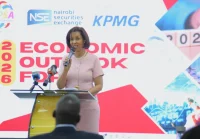The tough operating business environment for Small and Medium Enterprises (SMEs) is to blame for the consistent shortfalls in revenue collection by the Kenya Revenue Authority (KRA) according to Kenya National Chamber of Commerce and Industry (KNCCI) Chairperson Kiprono Kittony.
Kittony who spoke during the AM Live show on NTV on Thursday argued that the government is losing a lot of money that it would have collected in revenue from SMEs, forecasting that the taxman will for the foreseeable future remain stuck in the current situation if the government doesn’t become innovative while addressing its challenges.
“Kenya has paid lip service to SMEs. It does not surprise me to see that we are seeing a reduction in the amount KRA is able to collect because we have not created an enabling environment for them to thrive,” said Kittony.
One of the major issues that has been cited by many as an inhibitor for SMEs’ growth is the cap on interest rates which has been described as counterproductive by experts.
“What is the point of having affordable credit if we can’t access it?” Vice Chairperson Kenya Private Sector Alliance (KEPSA) Tom Omariba posed during a consultative meeting on Kenya’s debt on Tuesday.
In context, Lebanon’s economy is driven by SMEs which remit 60-70% revenue that the government collects.
READ: PAIN FOR SMALL TRADERS AS KRA SET TO EFFECT NEW TAX
The Lebanese government has made it easy for SMEs to thrive by formulating policies that make it easy for banks to avail credit to the enterprises including eliminating regulatory bottlenecks that make it easy to set up startups and a favourable tax regime for small businesses as captured in the Lebanese government’s SME Strategy Roadmap to 2020.
SEE ALSO: KENYANS EARN AVERAGE OF SH78,600
President Uhuru Kenyatta has been vocal in his support for SMEs.
In 2018, he directed Energy Cabinet Secretary Charles Keter to lower electricity costs for the enterprises and also called on banks to open credit lines for small and medium businesses.













4 Comments